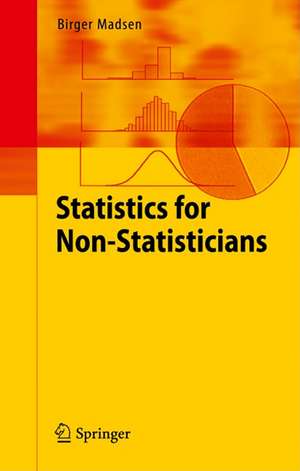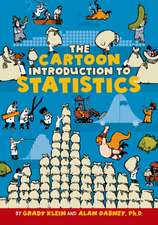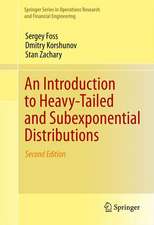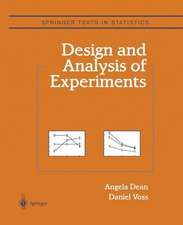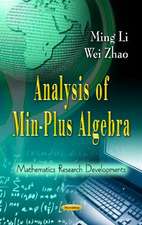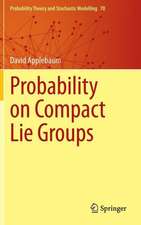Statistics for Non-Statisticians
Autor Birger Madsenen Limba Engleză Hardback – 15 apr 2011
The book is untraditional, both with respect to the choice of topics and the presentation.
The topics were determined by what is most useful for practical statistical work: even experienced statisticians will find new topics or new approaches to traditional topics.
The presentation is as non-mathematical as possible. Mathematical formulae are presented only if they are necessary for calculations and/or add to readers’ understanding. A sample survey is developed as a realistic example throughout the book, and many further examples are presented, which also use data spreadsheets from a supplementary website.
Preț: 387.75 lei
Nou
Puncte Express: 582
Preț estimativ în valută:
74.21€ • 76.55$ • 62.80£
74.21€ • 76.55$ • 62.80£
Carte tipărită la comandă
Livrare economică 04-18 martie
Preluare comenzi: 021 569.72.76
Specificații
ISBN-13: 9783642176555
ISBN-10: 3642176550
Pagini: 160
Ilustrații: XV, 160 p.
Dimensiuni: 155 x 235 x 18 mm
Greutate: 0.41 kg
Ediția:2011
Editura: Springer Berlin, Heidelberg
Colecția Springer
Locul publicării:Berlin, Heidelberg, Germany
ISBN-10: 3642176550
Pagini: 160
Ilustrații: XV, 160 p.
Dimensiuni: 155 x 235 x 18 mm
Greutate: 0.41 kg
Ediția:2011
Editura: Springer Berlin, Heidelberg
Colecția Springer
Locul publicării:Berlin, Heidelberg, Germany
Public țintă
Upper undergraduateCuprins
Preface.- 1 Data Collection.- 2 Presentation of Data.- 3 Description of Data.- 4 The Normal Distribution.- 5 Analysis of Qualitative Data.- 6 Error Sources and Planning.- 7 Assessment of Relationship.- 8 Comparing Two Groups.- 9 Appendices.- Index.
Recenzii
From the reviews:
“The book is built around 5 basic chapters dealing with collection of data, statistical concepts and tests. All subjects are illustrated by examples and references are made as to how this is estimated. … Birger Madsen’s book is built around arguments of this kind of underpinning examples. There are formulas, calculations, and graphics, so that plenty of assistance is provided, irrespective of how one gets to grips with the subject in the easiest possible way.” (Peter Linde, International Statistical Review, Vol. 81 (1), 2013)
“The book is organized in nine chapters. They successively introduce the basics in descriptive Statistics (that is, presentation, collection and description of data) and the main notions in classical analytical Statistics … . contains a summary of Probability and Statistics, a glossary of terms and, like most books in this field, tables of useful distributions. The presentation of the book, both visually and mathematically, is good and well organized and may provide a pleasant (and useful) reading for … statisticians and non-statisticians.” (Marco Castrillon Lopez, The European Mathematical Society, February, 2012)
“The book is built around 5 basic chapters dealing with collection of data, statistical concepts and tests. All subjects are illustrated by examples and references are made as to how this is estimated. … Birger Madsen’s book is built around arguments of this kind of underpinning examples. There are formulas, calculations, and graphics, so that plenty of assistance is provided, irrespective of how one gets to grips with the subject in the easiest possible way.” (Peter Linde, International Statistical Review, Vol. 81 (1), 2013)
“The book is organized in nine chapters. They successively introduce the basics in descriptive Statistics (that is, presentation, collection and description of data) and the main notions in classical analytical Statistics … . contains a summary of Probability and Statistics, a glossary of terms and, like most books in this field, tables of useful distributions. The presentation of the book, both visually and mathematically, is good and well organized and may provide a pleasant (and useful) reading for … statisticians and non-statisticians.” (Marco Castrillon Lopez, The European Mathematical Society, February, 2012)
Textul de pe ultima copertă
This book was written for those who need to know how to collect, analyze and present data. It is meant to be a first course for practitioners, a book for private study or brush-up on statistics, and supplementary reading for general statistics classes.
The book is untraditional, both with respect to the choice of topics and the presentation.
The topics were determined by what is most useful for practical statistical work: even experienced statisticians will find new topics or new approaches to traditional topics.
The presentation is as non-mathematical as possible. Mathematical formulae are presented only if they are necessary for calculations and/or add to readers’ understanding. A sample survey is developed as a realistic example throughout the book, and many further examples are presented, which also use data spreadsheets from a supplementary website.
The book is untraditional, both with respect to the choice of topics and the presentation.
The topics were determined by what is most useful for practical statistical work: even experienced statisticians will find new topics or new approaches to traditional topics.
The presentation is as non-mathematical as possible. Mathematical formulae are presented only if they are necessary for calculations and/or add to readers’ understanding. A sample survey is developed as a realistic example throughout the book, and many further examples are presented, which also use data spreadsheets from a supplementary website.
Caracteristici
Book for practitioners Presentation is as non-mathematical as possible Contains many examples using statistical functions in spreadsheets A realistic sample survey Fitness Club has been used as example throughout the book Fills a gap in the existing literature about statistics Includes supplementary material: sn.pub/extras
